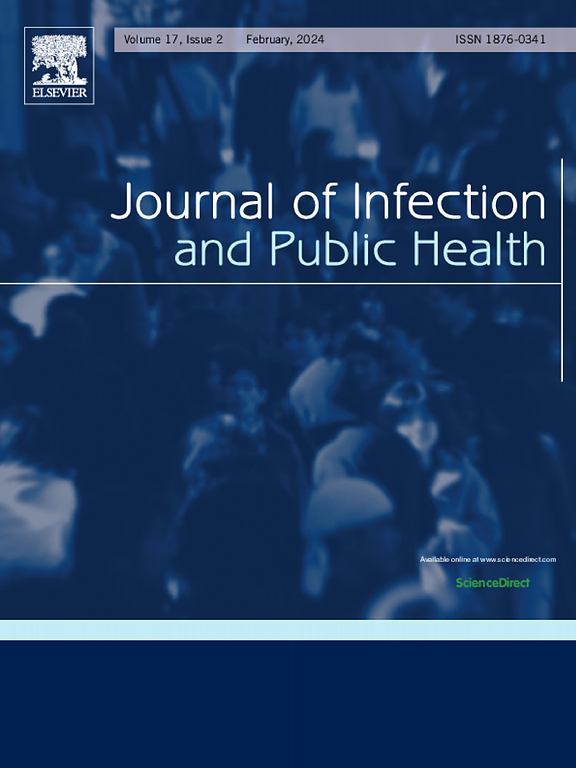2019冠状病毒病大流行期间中东人群的心理健康和精神药物趋势:对卡塔尔电子医疗记录的系统分析
IF 4
3区 医学
Q1 INFECTIOUS DISEASES
引用次数: 0
摘要
2019冠状病毒病大流行对人群的心理健康产生了不利影响。我们的目的是研究COVID-19大流行对精神健康障碍(mhd)患病率和治疗的影响,特别关注卡塔尔精神药物处方的模式。它提供了对全球危机期间精神卫生保健动态的重要见解。方法在这项回顾性观察性研究中,我们对2019年至2022年期间在卡塔尔心理健康服务(MHS)就诊的267,116名门诊患者的数据进行了分析。这项研究的重点是门诊就诊和精神药物处方的趋势。结果与大流行前相比,2022年MHS门诊访问量显著增加56.6% %,表明心理卫生服务的利用率有所提高。抑郁症和焦虑症占主导地位,反映了全球模式。抗抑郁药的处方增加了大约40% %,突出了心理困扰的增加。结论:研究结果强调,有必要制定量身定制的治疗方案和健全的精神卫生保健基础设施,以解决危机期间mhd日益增加的负担。将遗传倾向与处方趋势分析相结合,为未来的干预提供了希望,有助于建立一个有弹性的精神卫生保健生态系统,能够适应危机环境及其他环境中不断变化的需求。本文章由计算机程序翻译,如有差异,请以英文原文为准。
Mental health and psychotropic medication trends during the COVID-19 pandemic in a middle eastern population: A systematic analysis of electronic medical records from Qatar
Background
The COVID-19 pandemic has had a detrimental impact on the mental health of populations. We aimed in this examines the impact of the COVID-19 pandemic on the prevalence and treatment of mental health disorders (MHDs), with a specific focus on patterns of psychotropic medication prescriptions in Qatar. It provides critical insights into the dynamics of mental healthcare during global crises.
Methods
In this retrospective observational study, we conducted an analysis of data derived from 267,116 outpatients attending Mental Health Services (MHS) in Qatar between 2019 and 2022. The study focused on trends in outpatient visits and psychotropic medication prescriptions.
Results
A significant increase of 56.6 % in MHS outpatient visits was observed in 2022 compared to pre-pandemic levels, indicating heightened utilization of mental health services. Depression and anxiety disorders were predominant, reflecting global patterns. Antidepressant prescriptions rose by approximately 40 %, highlighting increased psychological distress.
Conclusion
The findings emphasize the necessity for tailored therapeutic protocols and robust mental healthcare infrastructures to address the rising burden of MHDs during crises. Integrating genetic predispositions with prescription trend analyses offers promise for future interventions, contributing to a resilient mental healthcare ecosystem capable of adapting to evolving needs in crisis contexts and beyond.
求助全文
通过发布文献求助,成功后即可免费获取论文全文。
去求助
来源期刊

Journal of Infection and Public Health
PUBLIC, ENVIRONMENTAL & OCCUPATIONAL HEALTH -INFECTIOUS DISEASES
CiteScore
13.10
自引率
1.50%
发文量
203
审稿时长
96 days
期刊介绍:
The Journal of Infection and Public Health, first official journal of the Saudi Arabian Ministry of National Guard Health Affairs, King Saud Bin Abdulaziz University for Health Sciences and the Saudi Association for Public Health, aims to be the foremost scientific, peer-reviewed journal encompassing infection prevention and control, microbiology, infectious diseases, public health and the application of healthcare epidemiology to the evaluation of health outcomes. The point of view of the journal is that infection and public health are closely intertwined and that advances in one area will have positive consequences on the other.
The journal will be useful to all health professionals who are partners in the management of patients with communicable diseases, keeping them up to date. The journal is proud to have an international and diverse editorial board that will assist and facilitate the publication of articles that reflect a global view on infection control and public health, as well as emphasizing our focus on supporting the needs of public health practitioners.
It is our aim to improve healthcare by reducing risk of infection and related adverse outcomes by critical review, selection, and dissemination of new and relevant information in the field of infection control, public health and infectious diseases in all healthcare settings and the community.
 求助内容:
求助内容: 应助结果提醒方式:
应助结果提醒方式:


